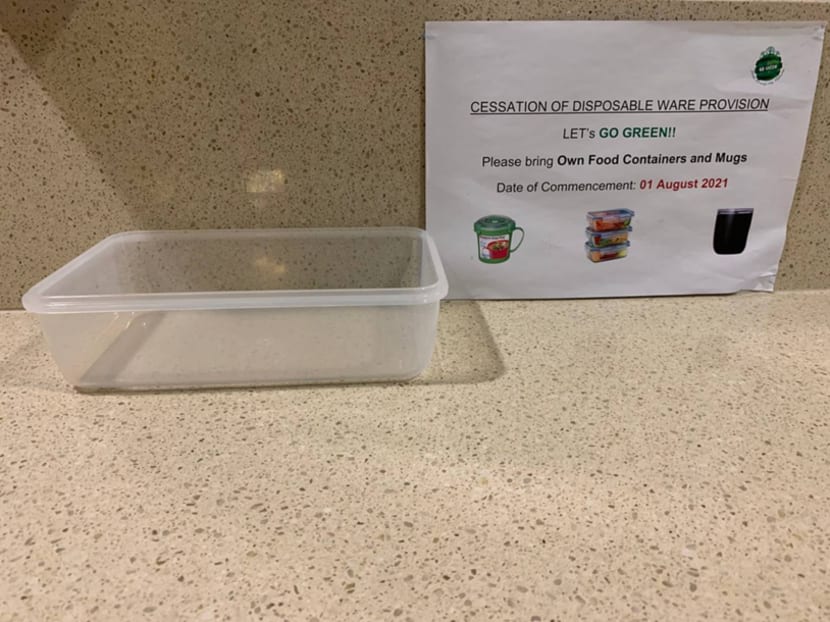Institutes of higher learning can do more to promote use of reusable containers on campus
As a university student staying at a residential college in the National University of Singapore (NUS), I find it heartening to see some dining halls, which cater breakfast and dinner for students, not providing plastic containers for takeaway food.

A sign at the writer's residential hall at NUS on its new rule on residents needing to use their own containers to take away food.
As a university student staying at a residential college in the National University of Singapore (NUS), I find it heartening to see some dining halls, which cater breakfast and dinner for students, not providing plastic containers for takeaway food.
Initially, I found it quite cumbersome to bring my own reusable container, as I was used to the convenience of disposable containers. Gradually, I got accustomed to the new system and adapted to it.
If this system could be implemented successfully in my residential college, is there a possibility of scaling it up to other canteens in NUS as well as to other institutes of higher learning (IHLs)?
During the two-month circuit break period starting in April 2020, an extra 1,334 tonnes of plastic waste was generated from takeaway and delivery meals.
The amount of additional plastic waste generated would be unimaginable if this became the new norm as Singapore transitions to living with Covid-19 as an endemic disease.
Plastic use and plastic waste are a significant contributor to global greenhouse gas emissions, exacerbating global warming. With countries striving to limit global temperature rises at the COP26 climate summit, it is paramount that young adults act now to save the earth.
I believe that the initiative of bringing reusable containers can be replicated at other IHLs due to their similar infrastructures and educational roles.
First, I appeal to IHLs to advocate the use of reusable containers to individuals who stay on campus. This could be done through institute-wide campaigns or one-off gifts of reusable containers for these individuals.
The presence of communal pantries with shared dishwashing liquids and the short distances between campus food stalls and accommodation make it convenient for people to take away food and wash their reusable containers afterwards.
Secondly, to encourage individuals who do not stay on campus to use reusable containers, IHLs could consider offering a compulsory educational module on the impact of climate change.
Class discussions could include brainstorming actionable steps on how to reduce waste generation such as promoting the use of reusable containers for takeaway meals. This module could end with an environmental innovation challenge, with the top-ranking teams tasked to implement their initiatives at the IHLs.
In the words of Prime Minister Lee Hsien Loong: “Climate change may seem abstract and distant for many of us, but it is one of the gravest challenges facing humankind”. The time to act is now to combat climate change.
ABOUT THE WRITER:
Jose Tan Shen Jie is a second-year accountancy student at NUS.
Have views on this issue or a news topic you care about? Send your letter to voices [at] mediacorp.com.sg with your full name, address and phone number.






